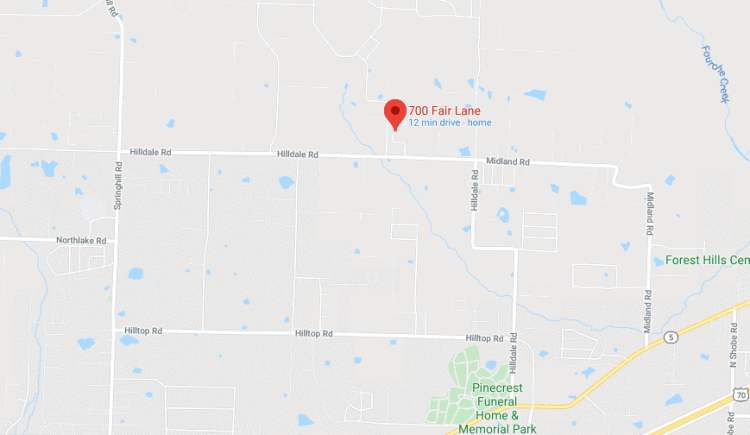The Arkansas Crime Information Center (ACIC) reports that the sex offender listed below has registered a new address on the Sex Offender Registry.
Offender Information
Leonard Charles Dickerson
More Info & Map Below…
Name: LEONARD CHARLES DICKERSON
AKA: MUQTADIR, ABDUR, Q; DICKERSON, LEONARD,; RASHA, JOSHUA, ABREHEM; DICKERSON, LENNY,; DICKERSON, LEONARD, CHARLES; DICKERSON-MUQTADIR, LEON,; DICKERSON, LEONARD, CHARLES; DICKERSON, LEONARD, C
Level: ![]() Level 3 Offender – High Risk
Level 3 Offender – High Risk
Physical Description
Age: (DOB: 1964-05-25)
Sex: M
Race: B Eyes: Brown
Hair: Unknown
Scars/Tattoos: Tattoo Left Shoulder
Address
700 BLK OF FAIR LANE ALEXANDER, AR 72002
Offenses
RAPE
Scroll down to get your questions answered about sex offenders in Saline County.
![]() Level 2 Offender – Moderate Risk
Level 2 Offender – Moderate Risk
![]() Level 3 Offender – High Risk
Level 3 Offender – High Risk
![]() Level 4 Offender – Sexually Dangerous Person
Level 4 Offender – Sexually Dangerous Person
FREQUENTLY ASKED QUESTIONS
Q. Why are so many sex offenders moving to Saline County?
A. Many of the offenders you see listed on MySaline are registering a new address in Saline County, but already lived in the county borders. It can be difficult for a sex offender to obtain and maintain a permanent address and therefore, if they are in compliance, they will register their new address. We will always report that. Keep in mind that there are those who do not comply and do not register new addresses and therefore, we cannot report on it.
Q. Why would authorities allow a sex offender to live so close to a school, daycare, church, etc?
A. Level 3 (high risk) and Level 4 (sexually dangerous) sex offenders have restrictions regarding living near schools. Under Arkansas law, a Level 3 or Level 4 offender is not allowed to live within 2,000 feet of a school, certain parks, youth centers or day cares. Level 1 and 2 do not. Also be aware that most sex offenders are not on house arrest and therefore will be in the community.
Q. Who is required to register?
A. Sex offenders are required to register in Arkansas. Details on the Sex Offender Registration Act of 1997 can be found in Arkansas Code Annotated §12-12-901 — 12-12-920.
- Any individual who is convicted of certain sex offenses and offenses against children if the conviction occurred as of the Act’s effective date, or
- Any individual who was incarcerated, on probation or parole, or serving any other form of community supervision as the result of an adjudication of guilt for the listed offenses as of this Act’s effective date, or
- Any person who is acquitted on the grounds of mental disease or defect for the listed offenses as of the Act’s effective date, or
- Any person who was required to register under the prior Act, the Habitual Child Sex Offender Registration Act, Arkansas Code Annotated §12-12-901, or
- Any sex offender moving to or returning to this state from another jurisdiction where registration is required. Such offenders shall register with the local law enforcement agency having jurisdiction within 3 business days of establishing residency.
Q. How are the offender levels determined?
A. All sex offenders required to register in the State of Arkansas must submit to assessment by the Sex Offender Screening & Risk Assessment Program coordinated by the Arkansas Department of Correction. Each offender is assigned a community notification level based on the results of the assessment. Offenders failing to submit to assessment are assigned by default to a community notification level of 3, but may also be considered for assignment as level 4.
Arkansas Code Annotated §12-12-913 (j)(1)(A), mandated that information on registered sex offenders determined to require the broadest level of notification to the public (Level 3 and Level 4), must be available on the Arkansas state website by January 1, 2004.
Pursuant to §12-12-911(Viii), Level 2 offenders that appear on the website are offenders that were 18 years of age or older at the time of the commission of the sex offense and the victim was 14 years of age or younger. Registered sex offenders who have not yet been assessed with a final community notification level are not included on this website.
Q. What should I do?
A. This notification will assist you and your family in avoiding situations that may make you vulnerable. Please remember that these individuals have served their sentences and are not wanted by the Sheriff’s office at this time. Citizen abuse of this information such as threats, intimidation, or harassment of these offenders is prohibited by law.
Children are particularly vulnerable to sex offenders. Open communication between parents and children is vital to family safety. Click on the link above at the right of the offender’s zip code to go to our website. If a picture is available on the website, show it to your family to help them recognize the offender, should they encounter him/her. In general terms, tell your children that this person has hurt someone and that they should stay away from this individual. Avoid scary details. The purpose behind community notification is to reduce the chance of future victimization by better informing the public. Nearly 80% of all sex crimes are committed by someone known to the victim.
Q. Is it just a matter of time before the offender commits another crime?
A. While there is no way that anyone can accurately predict the future behavior of another person, past behaviors are an indication of whether an individual, or group, poses a higher risk to the public. For example, if a driver has speeding tickets, they pose a greater risk to be in a traffic accident than drivers who do not; thus, they pay more for their insurance because they are more likely to get into an accident than non-speeders. However, not all speeders get into accidents. In fact, most will not have an accident; it’s just that they are statistically more likely to have an accident than are other drivers. Similarly, not all offenders will commit another crime; however, knowledge of a potential risk should assist you and your family in avoiding situations that allow predators to have easy access to victims.
Q. There is a sex offender in our area that I believe is coming in contact with children. What should I do?
A. First of all, do not confront the individual. Please inform your local Arkansas law enforcement agency of your suspicion, who will inquire and determine the appropriate course of action to be taken.
Q. What do I tell my children about this offender?
A. DON’T accept a ride from this person. DON’T go into this offender or any stranger’s home or yard. TELL your parents if this person offers you toys, money or gifts, or speaks to you in a way that makes you uncomfortable.
Other safety tips to discuss with your children:
- Teach your children that there are certain kinds of strangers that can assist them when they need help – adults with children, other children, and police officers in uniform or store clerks in the mall.
- Teach your children how to dial 911 and to use a pay phone without money.
- Teach your children to trust their feelings and say “NO,” and run away from a situation that doesn’t feel right.






